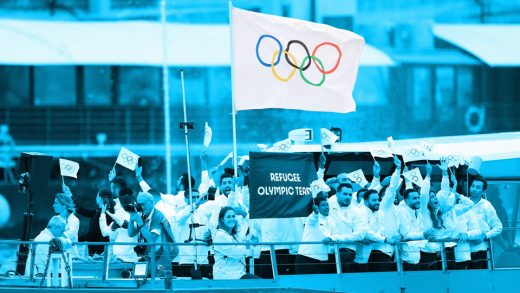5 tactics Olympians and athletes use that can help you succeed at work
5 tactics Olympians and athletes use that can help you succeed at work
Olympic athletes are the gold standard when it comes to traits like grit, determination, stick-to-itiveness, and grace in the wake of setbacks.
Welcome to Work Smarter, Fast Company‘s newsletter on career, leadership, and productivity advice. You can sign up to receive this newsletter every week here.
The thrill of victory and the agony of defeat are playing out on the world stage once again at the Paris Olympics. And who doesn’t love a good ”winning against all odds” story?
This year, the trials have an added challenge: as temperatures around the world continue to rise, Olympic competitors have had to adapt and train for extreme heat. Fast Company’s Adele Peters talked to Christopher Blevins, a mountain biker who is competing in the Olympics. “This means sitting in a sauna after rides or riding on a stationary bike with the heat on full blast and multiple layers and jackets on,” he said. “It’s not fun by any means, but it’s necessary to prepare for the increasingly hot races we have in the summer.”
And then there are the athletes who are among the world’s 100 million displaced persons and found themselves living and training in a new and unfamiliar country. The Refugee Olympic Team has 36 athletes, representing 12 sports, each of whom comes from countries torn by political turmoil or war, famine, or natural disaster and made it to Paris despite the odds.
It’s no wonder then, that we often hold up Olympians and athletes as the gold standard when it comes to traits like grit, determination, stick-to-itiveness, and grace in the wake of setbacks. Here are five traits that even the least athletic among us can learn from Olympians and athletes:
Stay present
Athletes are often accomplished at managing their mindset to compete at high levels. And staying present is one key to success. “Staying in the present can help athletes avoid being overwhelmed or consumed by the significance of their event or distracted by the disappointment of past failures and the pressure of high medal expectations,” Keele University’s Mike McGreary wrote.
Avoid comparisons
Fast Company and Inc. CEO Stephanie Mehta focused on the emotional intelligence of Olympians and elite athletes in her latest column. She notes that EQ expert Justin Bariso observed how Team USA’s Simone Biles avoids comparing herself to the competition. Bariso said, “Rather than compare herself with others, or even with a past version of herself, Biles is focused on being the best she can be, in the moment.” This has paid off in multiple gold medal wins.
Visualize the desired outcome
Public speaking expert Vanessa Wasche points out that mental imagery is an essential tool for athletes. “They picture their stance. They imagine throwing the perfect pitch. They see the goal line,” she explained. “By using these tools of imagery, they better prepare for a performance or a competition when the pressure is on. Studies have shown that these types of visualizations are effective.”
Take the coaching
Former figure skater Liz Melton wrote, “The first time you learn a new trick, pass to a new teammate, or try out new equipment, you will fail. That’s the point of having a coach. They can tell you what you’re doing wrong or right and help you perfect your technique. But if you don’t learn to listen to your coach and put what they say into practice, you’ll never succeed.”
Strike a balance
As ultra-endurance athlete Rich Roll says, “My greatest teacher was my own pain and discomfort.” Yet he recognized that he’s “good” at suffering, and has to strike a healthy balance. “The larger piece, and the one that’s more difficult to allow to be at the forefront of how I make decisions and approach projects, is that surrender piece,” he told Fast Company reporter Jenna Abdou. “It doesn’t have to be painful.”
ABOUT THE AUTHOR
(16)



